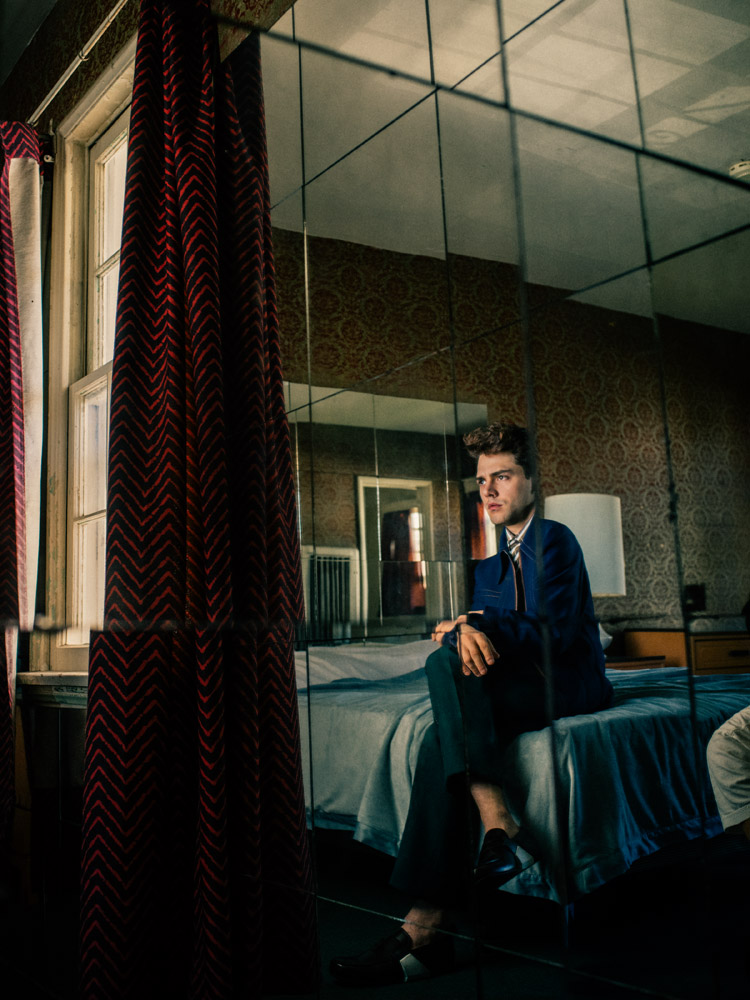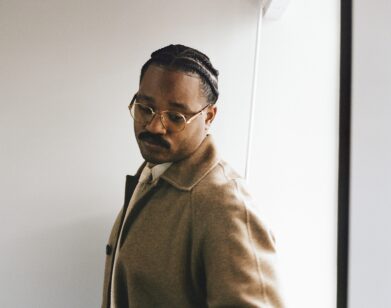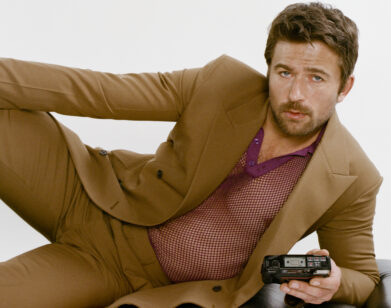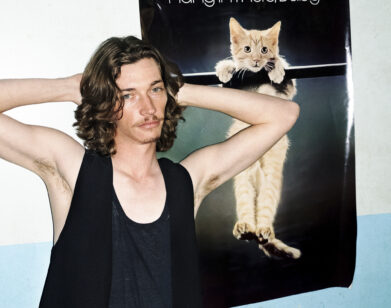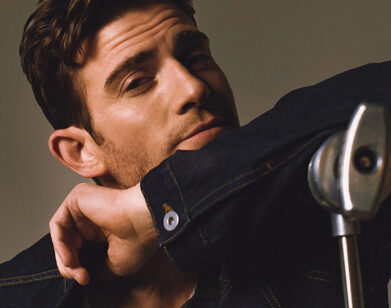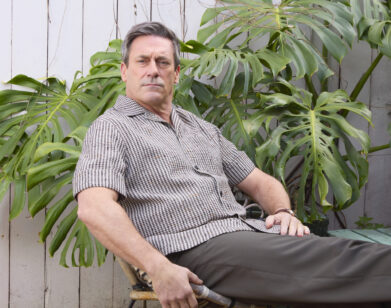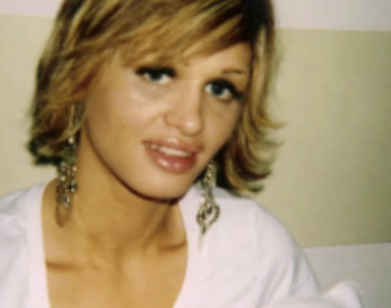Xavier Dolan
Even the characters that seem so far away intellectually or socially, for me, when they speak, it will always be my word. Xavier Dolan
When Xavier Dolan presented his first directorial effort, I Killed My Mother—an autobiographical psychodrama about an unruly teenager and his teetering, at-wit’s-end mother—at the Cannes Film Festival in 2009, he had just turned 20. The film received an eight-minute standing ovation, and the labels subsequently affixed to the now 25-year-old Québécois writer, filmmaker, and actor-wunderkind, enfant terrible—certainly spoke to Dolan’s precocious emerging voice. But in the past five years (and with four more feature films), he’s put together a body of work and a distinct point of view that might just make him contemporary cinema’s next great hope.
The stories he’s told—a pair of best friends falling in love with the same man (Heartbeats, 2010); a transgender woman and her partner coming to terms with her choice to transition (Laurence Anyways, 2012); a twentysomething menaced by the brother of his dead boyfriend (Tom at the Farm, 2013); and his latest film, Mommy, a scrappy widow and her troubled son fighting against the world for self-preservation—examine the intimate experiences of characters typically beyond the range of quote-unquote normalcy, moving toward emotional or revelatory catharsis.
Last year at Cannes, Dolan’s film won the Jury Prize (an honor he shared with Jean-Luc Godard), but it wasn’t just the jury who was impressed. Jessica Chastain, who saw the film at the festival, reached out to Dolan via Twitter, and not only have they embarked on a friendship, Chastain will star in Dolan’s first English-language feature, the upcoming showbiz drama The Death and Life of John F. Donovan.
In late November, while she was on a brief break from promoting her film Interstellar, Chastain phoned Dolan at his home in Montreal to talk about growing up among women, the intoxicating power of James Cameron, and Mommy, Canada’s entry for the Best Foreign Language Film Oscar.
JESSICA CHASTAIN: Hi, sweetheart! This is the first time I’ve ever been on this side of an interview. The first time we properly met was in New York, but I saw Mommy at the Cannes Film Festival this year and I was so blown away. I tweeted, not even really expecting anything, how much I loved the film, and then you and I had a very funny exchange.
XAVIER DOLAN: Should we have a recollection of that?
CHASTAIN: I think people should know how charming you are. I think we should tell them, first of all, that you’re my beard. Is that correct?
DOLAN: [laughs] There’s an awards season coming, and if I’m a part of it, I’m going to need a beard!
CHASTAIN: If you ask me, I am there for you, babe, 100 percent, but you have to take me to dinner first. Do you remember the video you sent me?
DOLAN: Celine Dion—is that it? I first sent you “Take You” by Justin Bieber, and then I deleted it because I was ashamed. How provincial of me, to send you our national treasure. Justin Bieber, Celine Dion—generations of Canadian national gems.
CHASTAIN: You wooed me with Justin Bieber, and so now I am forever your beard, my friend. [laughs] Okay. So where were you born?
DOLAN: I was born in Montreal at the Children’s Hospital. It sounds very cute, but that’s the actual name.
CHASTAIN: Did you grow up in an artist household?
DOLAN: My dad sort of did everything. He’s a musician, a composer, an actor—he’s an artist in all possible ways. He drew and painted—he still does. But even though he was composing his music, they were pop songs, like “Take You.” [both laugh] Not the same budget, though. My parents divorced when I was very young. My mother moved to a faraway land—suburban Montreal. I was brought up in a mainstream environment, culturally speaking. I watched all the kids films—Matilda [1996], Jumanji [1995], Home Alone [1990].
CHASTAIN: What brought you to acting?
DOLAN: My aunt Julie was a production manager and she heard of an opening. Some show was looking for children to run around the house or whatever. I auditioned and got the part, and I showed up in all of my monstrous energy, bouncing everywhere like an electron. I loved the experience, and I think it was important to my mom because she watches every show on TV, like 20 of them, and records with her VHS—yes, that’s correct, VHS. Anyway, sorry, I got lost on my mom again. I digress on my mom. Then I just started auditioning for commercials and shows and films. I got a part in a package of commercials for this big drugstore, from the age of 6 to 10. For four years I shot those commercials and old ladies would stop me on the street and grab my cheeks. That’s how it started.
CHASTAIN: So you digress to your mother. [laughs] It’s interesting going through your films—I want to know how much of it is autobiographical. You were just talking about your mother recording television shows. In your films, the television is an obstacle for bonding between a parent and a child. Is that something you directly took from your life?
DOLAN: In what movies have you noticed that?
CHASTAIN: Laurence Anyways and I Killed My Mother.
DOLAN: You’ve seen I Killed My Mother?
CHASTAIN: Of course, honey! I do my research.
DOLAN: [laughs] Well, I’m very flattered that you would research. When, at night? [laughs] How very extrastellar of you to watch these. Well, you’re right. I Killed My Mother is autobiographical. I would say the percentage of accuracy is 250 percent. I’m kidding—it’s, like, 240. The other films aren’t really. I’m very far from Laurence Anyways. I haven’t experienced heterosexual love and then a gender switch. I haven’t been held hostage like Tom is in Tom at the Farm. I haven’t lived any of these things, but every character is very personal because there’s a lot of me in their anger, their loneliness, and in their rage against society, against people who ostracize people who are different. Even the characters that seem so far away intellectually or socially, for me, when they speak, it will always be my words. There’s a lot of my mom in these characters because you write characters with the things that you’ve watched. As an actor, I’ve been recording forever. I’m a watcher. I’m a stalker. I love everything about people: the way they walk, the way they talk, the way they cry, the way their mouth is distorted whenever they do this or say that. It’s always been a passion for me to observe.
I’ve been recording forever. I’m a watcher. I’m a stalker. I love everything about people . . . It’s always been a passion for me to observe. Xavier Dolan
CHASTAIN: You started acting when you were 4. What brought you to writing and directing?
DOLAN: I always wrote. I’ve written stories since I was 9. We didn’t have a computer at home, but my aunt Magda had one. Whenever I’d go to her place, I was in the basement working on her computer, writing stories. Then I would save them on a … Fuck, what would you call these? They’re so gone right now.
CHASTAIN: Floppy disks?
DOLAN: Exactly! Yes. [both laugh] Floppy disk. I love you for bringing the words to my illiterate mouth.
CHASTAIN: Stop it! You have to remind everyone that this is not your native tongue.
DOLAN: My first language is French. I just love words so much, and in French it feels like I can say whatever I want however I want. In English I feel like I’ve got some words … [laughs] It often feels like I’m lacking the precise term, and it’s really annoying to me. So I would save these stories on a floppy disk until the next time I would go to my aunt’s, when I could continue to write the story of guardian angels sent to Earth to protect the mere mortals.
CHASTAIN: Oh my gosh.
DOLAN: That was the sort of stories that I would write, called The Indispensables or whatever else. There was one called Pink Wings. It was very, very gay. There were always angels.
CHASTAIN: How old were you when you wrote this? You’re saying it was pretty gay—at that time, did you actually know that you were?
DOLAN: I think I always knew. But, then, I didn’t know. I had girlfriends when I was young. [laughs] I was a crazy child. It was such a special childhood. When I was 8, I saw Titanic [1997] with my mom—I rarely went to the movies with my mom—and then we saw Finding Nemo [2003]. One day she brought me to see As Good as It Gets [1997], and I was pretending I was going to the bathroom when I was actually watching Titanic again in another room. When we saw the movie, it transformed my childhood into something else. I was a dreamy kid, and I was dressing up and pretending to be characters, and I was acting out and everything, but when I saw the movie, it made me crazy. I started designing costumes, drawing something like 2,000 outfits. All of that stemmed from seeing the costumes and all the production design and how big it was. It was so vast. It had such a huge impact on my childhood, telling me that it was legitimate to dream that big. The other kids were playing hockey, and I was drawing these clothes and writing letters to Danny DeVito and Leo DiCaprio. “Dear Leonardo. I’m 8 years old. I go to school. I love school.” The letters started like that. Anyway, he never answered, and now it’s too late.
CHASTAIN: Aw.
DOLAN: There will be hell to pay. [Chastain laughs] I didn’t know I was gay, but I knew I was quite different—and not in a special way. My obsession with DiCaprio and [Kate] Winslet and the costumes and everything was so disproportionate. It scared everybody. Actually, I think everybody knew but me. I knew for sure when I was 11 or 12. I came out to my cousin when I was 13. I said something so stupid. If a kid said a line like that in a TV show, the screenwriter would be fired and killed immediately. I told her, “I love women in my heart but not in my undies.” Something like that.
CHASTAIN: No, you did not! [laughs]
DOLAN: She reminds me of that often. It was horrible.
CHASTAIN: Do you feel that with your writing and directing and acting you can delve into what it was like to be that 8-year-old kid watching Titanic and trying to figure out their sexuality? Is it a way for you to explore that within yourself?
DOLAN: I think it’s a way to channel rage. I was a very violent kid. I think movies and writing and art have been a way of channeling this. But I have this will to defend people—it can be all sorts of people. In Laurence Anyways it was a transgender woman; in I Killed My Mother it was an adolescent who was rejecting his mother because he is going through his coming-of-age crisis; in Mommy it’s a more existential thing. These characters are expressive and they’re flamboyant, but they have nothing to do with the other characters from the other movies—it’s always about the things that marked me when I was young. Batman Returns [1992], Titanic, those are the movies that have printed something very deeply into me. I recently realized that most filmmakers start making movies when they’re 30. So they’re looking to the films that they saw when they were 17, 18, 25. Most of them have an education, and if they don’t, they spend years watching films. The only years I’ve spent watching movies were the years when I was a kid, and my father brought me to Jumanji. He didn’t tell me, “Kid, I’m going to show you Bergman and Eisenstein and Citizen Kane.” No.
CHASTAIN: Mommy was in the main competition at Cannes, and it won the Jury Prize. This is your fifth feature film that you’ve made, correct?
DOLAN: Yeah.
CHASTAIN: How old were you when it won the Jury Prize?
DOLAN: I was 25, the age I am right now. And by the time this interview is published, I will still be 25. I will be 25 forever.
CHASTAIN: First of all, congratulations, because Mommy has been selected as Canada’s entry for Best Foreign Language Film for the Academy Awards, which is huge, hello. The film hinges on this imaginary Canadian law that allows parents to give their children up to the state without involving the courts or a fee. What brought this to your mind?
DOLAN: That law is something I read about that had been voted on in Nebraska in the early 2000s. It’s been abrogated, but it was a Safe Haven law that applied to older children. It was used by parents who were barely scraping by, but were also endangered by their behaviorally disordered children. I read about that through a mother’s story, a mother who had abandoned her child in one of those hospitals. She was completely helpless. Her son was younger than the one in Mommy. She had another son, I think, and her son would be very violent, physically and verbally abusive, to her other son and to her. He was a good-hearted kid, of course, and he was mentally ill, and there was no health care whatsoever. She’s completely at the end of her rope, and she sees a future where one day she won’t be able to stop her kid from killing himself or killing someone, so she brings him to this place. I was really moved by the story and thought, “Well, that’s one for a movie eventually.” Then one day I shot with Antoine-Olivier Pilon, who is the lead in the film, in the music video for “College Boy” by this French band, Indochine. I had a major artistic crush on him.
CHASTAIN: He’s also in Laurence Anyways, right?
I was a very violent kid. I think movies and writing and art have been a way of channeling this. Xavier Dolan
DOLAN: He appears briefly in Laurence Anyways. He was already strikingly charismatic and impressed everybody. He really impressed me. I saw him and I was like, “This is the kid from this movie I’ve been planning on doing.” He was one of the elements that impelled me toward writing Mommy. Him, and hearing Ludovico Einaudi’s song “Experience”—he’s an Italian composer; that is the piece you hear in the movie when Diane, the mother, dreams of the future. When I first heard it through a friend at a random party, I was like, “Oh my God. This is a song for a mother who sees the future that she will never have, who dreams the life that she will never have.” I wrote that scene not knowing it would be in Mommy.
CHASTAIN: Anne [Dorval]’s performance is so incredible. Everyone’s performance in the film—Suzanne Clément … In all of your films, the female characters are so inspiring to watch. They’re not stereotypes of an idea. You allow the women in your films to have flaws and strengths. Speaking as an actress, I can tell you it’s very rare to get scripts like that. When you won the prize in Cannes—and the president was Jane Campion—you said, “The Piano [1993] was the first film that I watched that defined who I am … [It] made me want to write films for women, beautiful women with soul and will and strength.”
DOLAN: I was brought up with my grandmother, with my great aunt, with my mom, with my babysitters. All the ladies, “All the single ladies.” [both laugh] It’s who I am. They are the people I want to talk about, they’re the people I want to protect, they’re the people I want to put in my movies and see fail or win. As a writer, as a human being, and as a young man, it’s easier for me to express my anger, to ask questions, to seek answers, to talk, to cry as a woman in a movie. I connect with those figures more than I connect with men. Men are born privileged in the scale of things—I’m generalizing, but it’s true. Women have to define themselves in the eyes of men. They have to fight for their rights, especially in a society that will pretend that there is no fight or no battle, that it’s a cliché, that feminists are reactionary, all these things. As a young man who struggled to find his identity and to find his place, I relate to that quest for belonging in society. With mothers, especially, with their flaws, the way they have made huge sacrifices in order to be good moms or just moms. They probably sacrificed a part of their career, they sacrificed some desires, some dreams. I cannot relate, but I love to talk about it.
CHASTAIN: Where have you been all my life?
DOLAN: Well, I’m here now.
CHASTAIN: Thank God!
DOLAN: And I’m not going anywhere.
CHASTAIN: In I Killed My Mother, your character leaves a note that says that he can be found “in his kingdom.” I’m wondering where your kingdom is.
DOLAN: I hope you’re not disappointed by the answer. Geographically, I can’t name a place, so I will talk artistically and emotionally. My kingdom is on a set. It’s the only place on Earth where I feel I’m not waiting for something. Except when I’m waiting for the touch-ups, the fucking touch-ups.
JESSICA CHASTAIN IS AN ACADEMY AWARD-NOMINATED ACTRESS WHO RECENTLY STARRED IN INTERSTELLAR AND A MOST VIOLENT YEAR. UPCOMING, SHE WILL STAR IN GUILLERMO DEL TORO’S CRIMSON PEAK.

